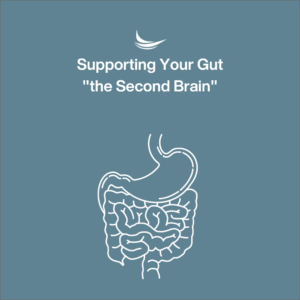Supporting Your Gut “the Second Brain”
 If you ever had a “gut feeling” experienced as intuition, “butterflies” feelings of dread, disgust, anticipatory anxiety, or an instinctive urge to respond with action, these are all examples of your brain communicating with your gut. The gut involves the esophagus, stomach, and bowel. The mind-body connection is the interconnected relationship between the mind and body. Our emotions and physical sensations are not separate. Specifically related to the gastrointestinal system, the mind-body connection is “the gut-brain connection”.
If you ever had a “gut feeling” experienced as intuition, “butterflies” feelings of dread, disgust, anticipatory anxiety, or an instinctive urge to respond with action, these are all examples of your brain communicating with your gut. The gut involves the esophagus, stomach, and bowel. The mind-body connection is the interconnected relationship between the mind and body. Our emotions and physical sensations are not separate. Specifically related to the gastrointestinal system, the mind-body connection is “the gut-brain connection”.
The gut has been referred to as the “second brain” of the enteric nervous system (ENS). Second to the brain, the gut has most nerve cells in the body (more than 500 million neurons) which makes it a complex neural network that has been compared to the complexities of the brain’s neural network. Also important are the vagus nerve and gut microbiome. The vagus nerve carries sensory information and is the main link between the ENS and the brain. Gut microbiome are bacteria that live in your gut. Changes in gut bacteria have been identified as a factor that can impact mood and emotions.
Common issues that show up in the therapy space related to the gut-brain connection include the following:
- anxiety impacted by worries, stress, and trauma
- concerns related to elimination and intestinal pain (e.g., diarrhea, gas, bloating, constipation, wetting or soiling)
- fears related to toileting and avoidance of using restrooms
- disorder eating and “comfort eating”
- adjusting to lifestyle changes after allergies or dietary needs
- depression and mood disorders
- neurodevelopmental disorders such as ADHD and autism
- avoidance of certain foods due to specific fears (e.g., of vomiting)
- sensitivities to taste and texture
- difficulties swallowing pills and gag reflexes
Making healthy lifestyle choices and finding positive ways to cope with stress and trauma are also factors. The body’s response to stress impacting the gastrointestinal system may include eating more or less of certain foods, increasing alcohol, tobacco, or other substances, and having stomach discomfort such as bloating, nausea, diarrhea, or constipation. These concerns can bring up a range of medical and mental health-related concerns and is it important to have a holistic approach to treatment.
More understanding of these systems is changing how medical and mental health providers understand the connections of feeding, eating, and digestion and how this impacts mood and health.
Having routine care with your primary care doctor and working with a behavioral medicine specialist such as a gastroenterologist is recommended to address gastrointestinal concerns. A mental health specialist can complement healthcare by supporting the patient with managing stressors, utilizing cognitive and behavioral strategies to address the thoughts, feelings, and behaviors, and practicing relaxation skills.
Written By: Charlotte Johnson, MA, LPCC



























